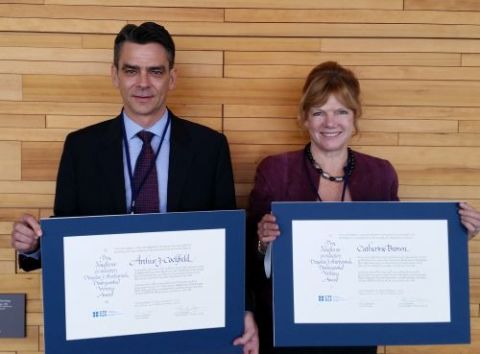
Art Cockfield co-author of Douglas J. Sherbaniuk Distinguished Writing Award winning paper
When it comes to winning the Canadian Tax Foundation's Sherbaniuk Award, Professor Art Cockfield is proud of both the win – and its implications. Appearing in vol. 61 of the Canadian Tax Journal, "Rectifying Tax Mistakes versus Retroactive Taxes: Reconciling Competing Visions of the Rule of Law," a collaboration with Catherine Brown of the University of Calgary's Faculty of Law, was first conceived as Cockfield was visiting Brown in California in 2012.
"I've learned that only good things can come from drinking red wine," Cockfield jokes drily -- the collaboration began when he and Brown were talking about retroactive taxation over a glass of Merlot. "We were discussing it, and thought it was fascinating that provincial courts are effectively acting differently than federal courts; the legal puzzle posed by the federal-provincial difference of vision when it comes to things like prospectivity and retroactivity and the rule of law."
Initially written and presented for a conference at Cornell University Law School, this paper on what Cockfield calls a normally "obscure topic" drew more attention as it was being authored thanks to then-current events in Canada. "As we were writing this, the PQ in Quebec drafted retroactive legislation on high-income earners," Cockfield explains. "It was so controversial that the government ultimately stepped back." The case, however, propelled retroactive taxation into a higher profile in national taxation discussion, and the paper ultimately went on to win the Sherbaniuk award, given by the Canadian Tax Foundation and decided by a committee of experienced tax academics and professionals for the best writing undertaken for the Foundation in the previous year.
"It's a nice honour," Cockfield says. "I was privileged to attend the awards ceremony in Vancouver, at a conference of around a thousand tax lawyers and professionals."
The paper, which examines the potential conflict between provincial and federal governments as regards property rights and retroactive tax legislation, explores how "fairness" comes into play when retroactive legislation impacts taxpayers' prior planning. "People generally expect that laws will be prospective, looking forward, and not retroactive," Cockfield explains. "Retroactivity is used by governments to do things like close loopholes and reach back to amend the results of the loopholes, but on an individual level, fairness comes into question. A person can look at the law, deploy resources and time, but then have the government say "well, it was legal when you did it, but now we are reaching backwards in time to punish you."
Cockfield and Brown hope that this article may play a role in addressing these issues. "Part of why we wrote it is because there’s a lot of litigation underway in provincial courts, where the courts are using their own equitable powers of rectification," he says. "I hope that our article can play a productive role in this. "